Part I Japan’s Support in Response to COVID-19
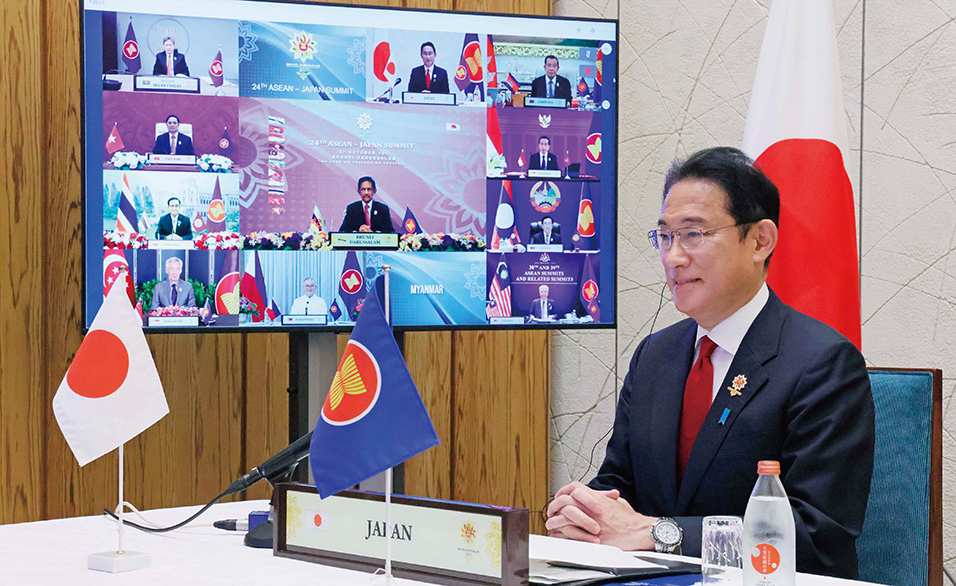
Prime Minister Kishida introducing Japan’s support in response to COVID-19 for the ASEAN region at the 24th ASEAN-Japan Summit Meeting (October 27, 2021) (Photo: Cabinet Public Affairs Office of the Government of Japan)
1 Japan’s Support in Response to COVID-19
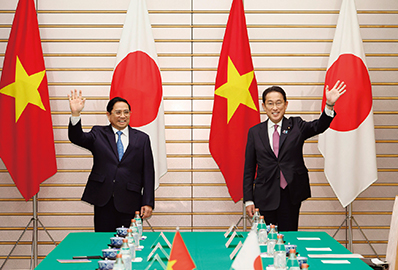
Prime Minister Kishida meeting with Prime Minister Chinh of Viet Nam. Prime Minister Chinh expressed his gratitude for the vaccines provided by Japan to Viet Nam and stated that he would like to strengthen cooperation with Japan in combating COVID-19. (November 24, 2021) (Photo: Cabinet Public Affairs Office of the Government of Japan)
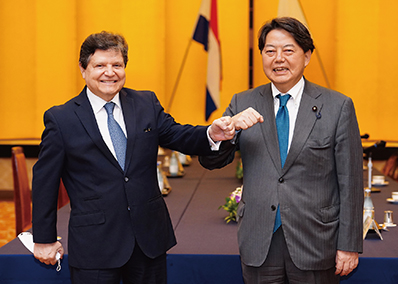
At the Japan-Paraguay Foreign Ministers’ Meeting, Foreign Minister Hayashi stated that Japan has supplied equipment necessary for strengthening medical systems during the COVID-19 pandemic and that Japan intends to continue providing cooperation for the economic and social development of Paraguay, including infrastructure development. (November 22, 2021)
In 2021, the COVID-19 pandemic continued to have a major impact on the entire world. The COVID-19 crisis is a common challenge for the international community and directly connected to human security, which requires the international community as a whole to work together. Through December 2021, Japan extended assistance totaling approximately ¥430 billion (approximately $3.9 billion) both bilaterally and through international organizations. In addition, Japan established the COVID-19 Crisis Response Emergency Support Loan, which has provided loans up to ¥700 billion (approximately $6.4 billion) over two years since 2020.
In order to achieve the World Health Organization (WHO) goal of vaccinating 70% of the population in all countries by mid-2022, it is essential to not only supply vaccines, but also to provide comprehensive support for its development, manufacturing, delivery, vaccination, etc., and to increase confidence in vaccines.
Japan has provided support through the COVID-19 Vaccine Global Access Facility (COVAX Facility)* and donated vaccines, to protect as many people’s lives as possible under the concept of “leaving no one’s health behind.” Japan has also advanced “Last One Mile Note 1 Support,” which improves cold chain Note 2 systems and provides related assistance to ensure the delivery of vaccines to vaccination sites. In addition, based on the belief that strengthening health and medical systems in developing countries is important for enhancing resilience against infectious diseases, Japan has provided health and medical equipment such as oxygen concentrators and ventilators. Furthermore, Japan has extended economic and financial support through Emergency Support Loans to developing countries whose financial conditions have become severe.
(1) Lifesaving Vaccine-related Support
In order to overcome the crisis of the pandemic, it is essential to improve and strengthen medical systems and ensure access to appropriate medical services in developing countries. In particular, it is necessary to ensure equitable access to safe, effective, and quality-assured vaccines in all countries and regions of the world. Japan has provided a variety of assistance bilaterally and through cooperation with UN agencies, international organizations, major donors, and others.
A. International Conferences on Vaccines and Japan’s Efforts for Vaccine Donations
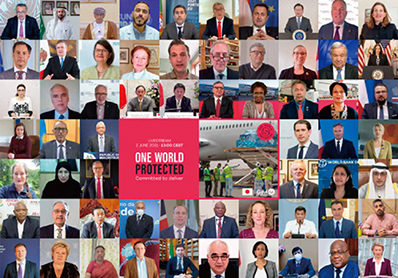
The Gavi COVAX AMC Summit (June 2021) (Photo: Gavi, the Vaccine Alliance)
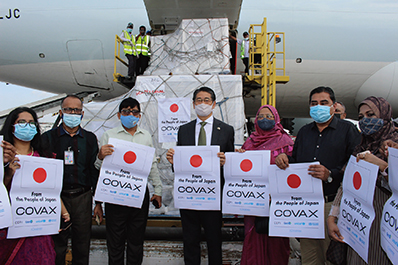
COVID-19 vaccine hand-over ceremony in Bangladesh (August 2021)
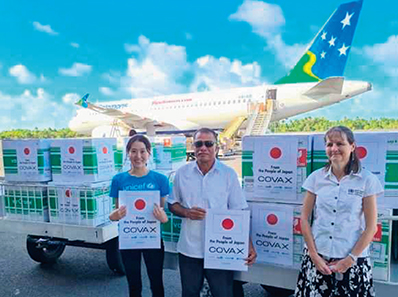
Minister for Line and Phoenix Islands Development Temari welcoming the arrival of vaccines in Kiribati (Photo: UNICEF)
Various international meetings discussed countermeasures to the COVID-19 crisis, including support for vaccine provision, in 2021 as well.
In June, Japan and Gavi, the Vaccine Alliance,* co-hosted (virtual format) the COVAX AMC Summit. As co-chair, Japan urged various national governments and the private sectors to provide funding. As a result, the Summit succeeded in securing $9.6 billion, which was well beyond the target of $8.3 billion, to provide 1.8 billion vaccine doses to protect nearly 30% of the population in COVAX Advance Market Commitment (AMC)* eligible economies by the end of 2021. Japan also announced that it would contribute an additional $800 million to the COVAX AMC for developing countries. This brought Japan’s total financial support for COVAX to $1 billion including the $200 million already contributed. Furthermore, Japan also announced that it would provide around 30 million doses of vaccines manufactured in Japan to other countries and regions.
At the G7 Cornwall Summit in June, then Prime Minister Suga led the discussion as the lead speaker for the session on health. The G7 reaffirmed its support for the Access to COVID-19 Tools (ACT) Accelerator, Note 3 and committed to share at least 870 million vaccine doses over 2022, and to support through finance and vaccine donations equivalent to 1 billion doses. The G7 welcomed the successful COVAX AMC Summit.
Subsequently, at the Global COVID-19 Summit organized by the United States in September and at the 76th session of the United Nations General Assembly in the same month, Japan delivered remarks to the world regarding its support for COVID-19 countermeasures, including vaccine donations. At the G20 Rome Summit in October, Prime Minister Kishida expressed support for the goal of vaccinating 70% of the population in all countries against COVID-19 by mid-2022.
Furthermore, at the Tokyo Nutrition for Growth (N4G) Summit 2021 hosted by Japan in December, Prime Minister Kishida stated that Japan would donate approximately 10 million doses of vaccines to Africa given that there are particularly urgent needs for vaccines, upon coordination with international organizations and relevant partners (see “ODA Topics 3,” regarding The Tokyo Nutrition for Growth Summit 2021).
From June 2021 to the end of February 2022, Japan has provided approximately 42 million doses of vaccines to 26 countries and regions (bilateral donation: approximately 25 million doses to Brunei, Indonesia, Malaysia, the Philippines, Taiwan, Thailand, and Viet Nam; donation through the COVAX Facility: approximately 17 million doses to 19 countries in Southeast Asia, Southwest Asia, Central Asia, Pacific Island countries, Latin America and the Caribbean, the Middle East, and Africa). In addition, via the United Nations Office for Project Services (UNOPS), Japan has provided partial support for transportation and other expenses necessary for the provision of vaccines through the COVAX Facility. In each country and region where vaccines from Japan arrived, major media such as TV and newspapers widely reported the story, and gratitude was expressed for vaccine donations.
B. “Last One Mile Support” to Deliver Vaccine to Each and Every Person
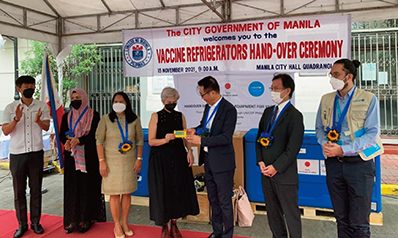
Hand-over ceremony in the Philippines for the provision of refrigerators under the “Last One Mile Support” (November 2021)
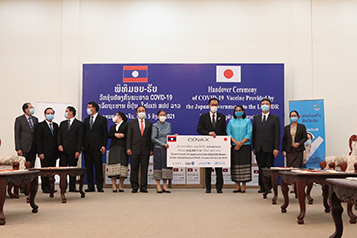
COVID-19 vaccine hand-over ceremony in Laos (August 5, 2021) (Photo: UNICEF Laos/2021/AKarki)
In developing countries, it has been a major challenge to transport donated vaccines to vaccination sites in each region in an appropriate manner. In order to deliver vaccines to vaccination sites swiftly and infallibly, it is essential to develop logistics networks such as cold chains. Note 4
Japan, in collaboration with JICA and the United Nations Children’s Fund (UNICEF), provided rapid support for ensuring the delivery of vaccines to each and every person in developing countries. JICA has contributed to the strengthening of vaccination systems in developing countries through providing Japanese-made cold storage facilities, transport vehicles, inspection equipment, and others, by utilizing its many years of experience and achievements in supporting the development of medical supply chains. As part of this “Last One Mile Support,” a total of ¥13.7 billion in grant aid was provided to 59 countries and regions in Southeast Asia, Southwest Asia, Pacific Island countries, Latin America and the Caribbean, Africa, and others by the end of December 2021 (see “Japanese Personnel at International Organizations Playing Active Roles on the Front Lines across the World amid the COVID-19 Pandemic,” regarding the activities of Japanese personnel at UNICEF).
C. Japan-Australia-India-the United States Cooperation for Vaccine Support
The first Japan-Australia-India-U.S. Leaders’ Video Conference was held in March 2021, and the four leaders launched the Quad Vaccine Partnership.
At the Second Japan-Australia-India-U.S. Summit Meeting held in Washington, D.C. in September 2021, the four leaders reaffirmed that the four countries play a major role to ensure equitable access to safe, effective, and quality-assured vaccines through vaccine donations and financing, and also concurred that they will continue to work together in response to COVID-19, including expansion of vaccine production and its supply to the Indo-Pacific region.
- Note 1: In fields such as logistics and communication services, this means the last segment of delivery of goods or services between the final provision site and the users or consumers.
- Note 2: A mechanism to deliver products to their destination while maintaining low temperatures. This allows the quality of medical goods such as vaccines to be preserved.
- Note 3: An international framework to accelerate the development, production, and equitable access to vaccines, therapeutics, and diagnoses for COVID-19. It was proposed by the WHO and others, and launched at the Coronavirus Global Response Summit (held in May 2020 and hosted by the EU) with Japan, the EU, France, Germany, Italy, Norway, Spain, and the United Kingdom as co-proposing countries.
- Note 4: See Note 2.
